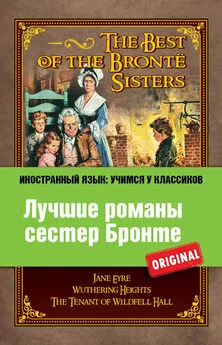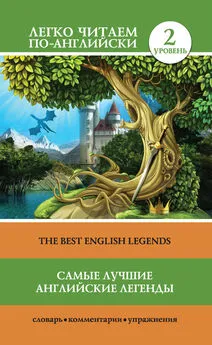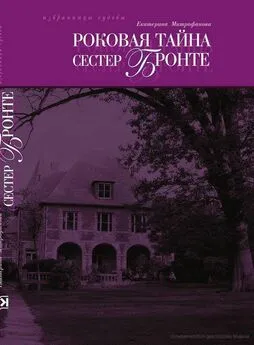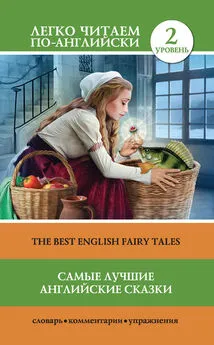Шарлотта Бронте - Лучшие романы сестер Бронте / The best of the Brontë sisters
- Название:Лучшие романы сестер Бронте / The best of the Brontë sisters
- Автор:
- Жанр:
- Издательство:Литагент «Эксмо»334eb225-f845-102a-9d2a-1f07c3bd69d8
- Год:2013
- Город:Москва
- ISBN:978-5-699-61892-7
- Рейтинг:
- Избранное:Добавить в избранное
-
Отзывы:
-
Ваша оценка:
Шарлотта Бронте - Лучшие романы сестер Бронте / The best of the Brontë sisters краткое содержание
«Иностранный язык: учимся у классиков» – это только оригинальные тексты лучших произведений мировой литературы. Эти книги станут эффективным и увлекательным пособием для изучающих иностранный язык на хорошем «продолжающем» и «продвинутом» уровне. Они помогут эффективно расширить словарный запас, подскажут, где и как правильно употреблять устойчивые выражения и грамматические конструкции, просто подарят радость от чтения. В конце книги дана краткая информация о культуроведческих, страноведческих, исторических и географических реалиях описываемого периода, которая поможет лучше ориентироваться в тексте произведения.
Серия «Иностранный язык: учимся у классиков» адресована широкому кругу читателей, хорошо владеющих английским языком и стремящихся к его совершенствованию.
Лучшие романы сестер Бронте / The best of the Brontë sisters - читать онлайн бесплатно ознакомительный отрывок
Интервал:
Закладка:
When I got there, I was forced to sit to rest me under the hedge; and while I sat, I heard wheels, and saw a coach come on. I stood up and lifted my hand; it stopped. I asked where it was going: the driver named a place a long way off, and where I was sure Mr. Rochester had no connections. I asked for what sum he would take me there; he said thirty shillings; I answered I had but twenty; well, he would try to make it do. He further gave me leave to get into the inside, as the vehicle was empty: I entered, was shut in, and it rolled on its way.
Gentle reader, may you never feel what I then felt! May your eyes never shed such stormy, scalding, heart-wrung tears as poured from mine. May you never appeal to Heaven in prayers so hopeless and so agonised as in that hour left my lips; for never may you, like me, dread to be the instrument of evil to what you wholly love.
Chapter XXVIII
Two days are passed. It is a summer evening; the coachman has set me down at a place called Whitcross; he could take me no farther for the sum I had given, and I was not possessed of another shilling in the world. The coach is a mile off by this time; I am alone. At this moment I discover that I forgot to take my parcel out of the pocket of the coach, where I had placed it for safety; there it remains, there it must remain; and now, I am absolutely destitute.
Whitcross is no town, nor even a hamlet; it is but a stone pillar set up where four roads meet: whitewashed, I suppose, to be more obvious at a distance and in darkness. Four arms spring from its summit: the nearest town to which these point is, according to the inscription, distant ten miles; the farthest, above twenty. From the well-known names of these towns I learn in what county I have lighted; a north-midland shire, dusk with moorland, ridged with mountain: this I see. There are great moors behind and on each hand of me; there are waves of mountains far beyond that deep valley at my feet. The population here must be thin, and I see no passengers on these roads: they stretch out east, west, north, and south – white, broad, lonely; they are all cut in the moor, and the heather grows deep and wild to their very verge. Yet a chance traveller might pass by; and I wish no eye to see me now: strangers would wonder what I am doing, lingering here at the sign-post, evidently objectless and lost. I might be questioned: I could give no answer but what would sound incredible and excite suspicion. Not a tie holds me to human society at this moment – not a charm or hope calls me where my fellow-creatures are – none that saw me would have a kind thought or a good wish for me. I have no relative but the universal mother, Nature: I will seek her breast and ask repose.
I struck straight into the heath; I held on to a hollow I saw deeply furrowing the brown moorside; I waded knee-deep in its dark growth; I turned with its turnings, and finding a moss-blackened granite crag in a hidden angle, I sat down under it. High banks of moor were about me; the crag protected my head: the sky was over that.
Some time passed before I felt tranquil even here: I had a vague dread that wild cattle might be near, or that some sportsman or poacher might discover me. If a gust of wind swept the waste, I looked up, fearing it was the rush of a bull; if a plover whistled, I imagined it a man. Finding my apprehensions unfounded, however, and calmed by the deep silence that reigned as evening declined at nightfall, I took confidence. As yet I had not thought; I had only listened, watched, dreaded; now I regained the faculty of reflection.
What was I to do? Where to go? Oh, intolerable questions, when I could do nothing and go nowhere! – when a long way must yet be measured by my weary, trembling limbs before I could reach human habitation – when cold charity must be entreated before I could get a lodging: reluctant sympathy importuned, almost certain repulse incurred, before my tale could be listened to, or one of my wants relieved!
I touched the heath: it was dry, and yet warm with the heat of the summer day. I looked at the sky; it was pure: a kindly star twinkled just above the chasm ridge. The dew fell, but with propitious softness; no breeze whispered. Nature seemed to me benign and good; I thought she loved me, outcast as I was; and I, who from man could anticipate only mistrust, rejection, insult, clung to her with filial fondness. To-night, at least, I would be her guest, as I was her child: my mother would lodge me without money and without price. I had one morsel of bread yet: the remnant of a roll I had bought in a town we passed through at noon with a stray penny – my last coin. I saw ripe bilberries gleaming here and there, like jet beads in the heath: I gathered a handful and ate them with the bread. My hunger, sharp before, was, if not satisfied, appeased by this hermit’s meal. I said my evening prayers at its conclusion, and then chose my couch.
Beside the crag the heath was very deep: when I lay down my feet were buried in it; rising high on each side, it left only a narrow space for the night-air to invade. I folded my shawl double, and spread it over me for a coverlet; a low, mossy swell was my pillow. Thus lodged, I was not, at least – at the commencement of the night, cold.
My rest might have been blissful enough, only a sad heart broke it. It plained of its gaping wounds, its inward bleeding, its riven chords. It trembled for Mr. Rochester and his doom; it bemoaned him with bitter pity; it demanded him with ceaseless longing; and, impotent as a bird with both wings broken, it still quivered its shattered pinions in vain attempts to seek him.
Worn out with this torture of thought, I rose to my knees. Night was come, and her planets were risen: a safe, still night: too serene for the companionship of fear. We know that God is everywhere; but certainly we feel His presence most when His works are on the grandest scale spread before us; and it is in the unclouded night-sky, where His worlds wheel their silent course, that we read clearest His infinitude, His omnipotence, His omnipresence. I had risen to my knees to pray for Mr. Rochester. Looking up, I, with tear-dimmed eyes, saw the mighty Milky-way. Remembering what it was – what countless systems there swept space like a soft trace of light – I felt the might and strength of God. Sure was I of His efficiency to save what He had made: convinced I grew that neither earth should perish, nor one of the souls it treasured. I turned my prayer to thanksgiving: the Source of Life was also the Saviour of spirits. Mr. Rochester was safe; he was God’s, and by God would he be guarded. I again nestled to the breast of the hill; and ere long in sleep forgot sorrow.
But next day, Want came to me pale and bare. Long after the little birds had left their nests; long after bees had come in the sweet prime of day to gather the heath honey before the dew was dried – when the long morning shadows were curtailed, and the sun filled earth and sky – I got up, and I looked round me.
What a still, hot, perfect day! What a golden desert this spreading moor! Everywhere sunshine. I wished I could live in it and on it. I saw a lizard run over the crag; I saw a bee busy among the sweet bilberries. I would fain at the moment have become bee or lizard, that I might have found fitting nutriment, permanent shelter here. But I was a human being, and had a human being’s wants: I must not linger where there was nothing to supply them. I rose; I looked back at the bed I had left. Hopeless of the future, I wished but this – that my Maker had that night thought good to require my soul of me while I slept; and that this weary frame, absolved by death from further conflict with fate, had now but to decay quietly, and mingle in peace with the soil of this wilderness. Life, however, was yet in my possession, with all its requirements, and pains, and responsibilities. The burden must be carried; the want provided for; the suffering endured; the responsibility fulfilled. I set out.
Whitcross regained, I followed a road which led from the sun, now fervent and high. By no other circumstance had I will to decide my choice. I walked a long time, and when I thought I had nearly done enough, and might conscientiously yield to the fatigue that almost overpowered me – might relax this forced action, and, sitting down on a stone I saw near, submit resistlessly to the apathy that clogged heart and limb – I heard a bell chime – a church bell.
I turned in the direction of the sound, and there, amongst the romantic hills, whose changes and aspect I had ceased to note an hour ago, I saw a hamlet and a spire. All the valley at my right hand was full of pasture-fields, and cornfields, and wood; and a glittering stream ran zig-zag through the varied shades of green, the mellowing grain, the sombre woodland, the clear and sunny lea. Recalled by the rumbling of wheels to the road before me, I saw a heavily-laden waggon labouring up the hill, and not far beyond were two cows and their drover. Human life and human labour were near. I must struggle on: strive to live and bend to toil like the rest.
About two o’clock p.m. I entered the village. At the bottom of its one street there was a little shop with some cakes of bread in the window. I coveted a cake of bread. With that refreshment I could perhaps regain a degree of energy: without it, it would be difficult to proceed. The wish to have some strength and some vigour returned to me as soon as I was amongst my fellow-beings. I felt it would be degrading to faint with hunger on the causeway of a hamlet. Had I nothing about me I could offer in exchange for one of these rolls? I considered. I had a small silk handkerchief tied round my throat; I had my gloves. I could hardly tell how men and women in extremities of destitution proceeded. I did not know whether either of these articles would be accepted: probably they would not; but I must try.
I entered the shop: a woman was there. Seeing a respectably-dressed person, a lady as she supposed, she came forward with civility. How could she serve me? I was seized with shame: my tongue would not utter the request I had prepared. I dared not offer her the half-worn gloves, the creased handkerchief: besides, I felt it would be absurd. I only begged permission to sit down a moment, as I was tired. Disappointed in the expectation of a customer, she coolly acceded to my request. She pointed to a seat; I sank into it. I felt sorely urged to weep; but conscious how unseasonable such a manifestation would be, I restrained it. Soon I asked her “if there were any dressmaker or plain-workwoman in the village?”
“Yes; two or three. Quite as many as there was employment for.”
I reflected. I was driven to the point now. I was brought face to face with Necessity. I stood in the position of one without a resource, without a friend, without a coin. I must do something. What? I must apply somewhere. Where?
“Did she know of any place in the neighbourhood where a servant was wanted?”
“Nay; she couldn’t say.”
“What was the chief trade in this place? What did most of the people do?”
“Some were farm labourers; a good deal worked at Mr. Oliver’s needle-factory, and at the foundry.”
“Did Mr. Oliver employ women?”
“Nay; it was men’s work.”
“And what do the women do?”
“I knawn’t,” was the answer. “Some does one thing, and some another. Poor folk mun get on as they can.”
She seemed to be tired of my questions: and, indeed, what claim had I to importune her? A neighbour or two came in; my chair was evidently wanted. I took leave.
I passed up the street, looking as I went at all the houses to the right hand and to the left; but I could discover no pretext, nor see an inducement to enter any. I rambled round the hamlet, going sometimes to a little distance and returning again, for an hour or more. Much exhausted, and suffering greatly now for want of food, I turned aside into a lane and sat down under the hedge. Ere many minutes had elapsed, I was again on my feet, however, and again searching something – a resource, or at least an informant. A pretty little house stood at the top of the lane, with a garden before it, exquisitely neat and brilliantly blooming. I stopped at it. What business had I to approach the white door or touch the glittering knocker? In what way could it possibly be the interest of the inhabitants of that dwelling to serve me? Yet I drew near and knocked. A mild-looking, cleanly-attired young woman opened the door. In such a voice as might be expected from a hopeless heart and fainting frame – a voice wretchedly low and faltering – I asked if a servant was wanted here?
Читать дальшеИнтервал:
Закладка:










